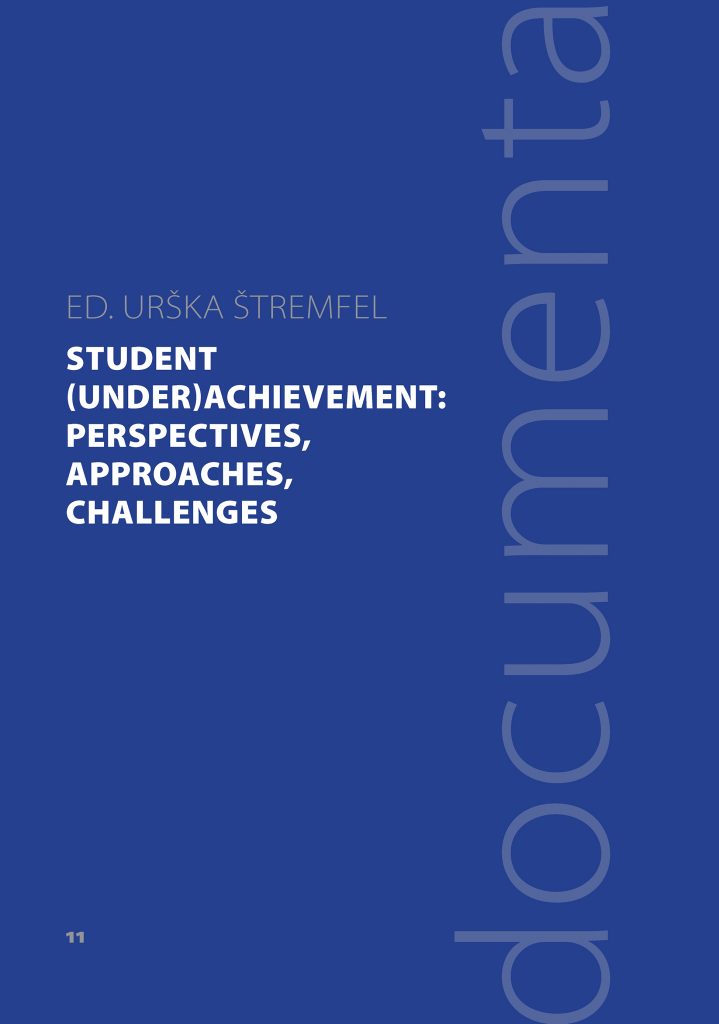
Student (Under)achievement: Perspectives, Approaches, Challenges.
Editor(s): Urška Štremfel
Type of work: scientific monograph
Number of pages: 310 strani
ISBN-13 (PDF): 978-961-270-247-2
ISBN-13 (HTML): 978-961-270-248-9
Način citiranja:
APA:
Štremfel, Urška, ed. (2016). Student (Under)achievement: Perspectives, Approaches, Challenges.
https://www.doi.org/10.32320/9978-961-270-247-2
MLA:
Štremfel, Urška, ed. Student (Under)achievement: Perspectives, Approaches, Challenges. Pedagoški inštitut, 2016.
<https://www.doi.org/10.32320/9978-961-270-247-2>
In modern society, student (under)achievement is taking on a new meaning. Rapid social and technological changes are reflected in the development of scientific approaches, which have, in recent decades, been an aid to acquiring new insights, developing new approaches and identifying new challenges of student (under)achievement. Regardless of ideological perspectives on the order of modern societies and the role education plays in them, it is clear that no such thing as an all-encompassing ‘magic formula’ has yet been invented, one that would enable the high learning achievement of all adolescents who take part in the educational process, in spite of the scientific progress and numerous international and national initiatives. No such magic formula has been found in the scientific monograph Student (Under)achievement: Perspectives, Approaches, Challenges either. However, the authors believe that by providing an in-depth insight and by merging some diverse, yet highly complementary approaches, some important compounds have been added to the formula, which will, along with the current approaches, contribute significantly to ensuring a high level of achievement among (Slovenian) adolescents.
The scientific monograph was produced as part of the project Raising Awareness and Opportunities of Lifelong Learning for Low Achievers, conducted at the Educational Research Institute between 2013 and 2014. The project is part of the programme ‘Lifelong Learning’, used by the European Commission to endorse European strategic objectives in education and training in EU member states, whereby particular emphasis is placed on the cooperation of interested stakeholders, experimentation and innovation.
The challenges faced as part of the project were underachieving students in primary and secondary education (i.e. underachieving in terms of international comparisons and relevant European benchmarks). In facing the challenges, the focus was mainly on identifying individual factors as well as those related to the family, school and wider social environments, which are associated with student achievement as suggested by the findings of international comparative assessment studies and other education-related studies. In addition to theoretical backgrounds resulting from research work and connecting different sciences, special attention has been devoted to developing approaches whose ultimate goal is oriented towards improving individuals’ learning achievement. Simultaneously these approaches are also efficient at addressing all the participants directly or indirectly involved in the educational process (i.e. teachers, adolescents and their parents) at different educational levels and through different content-related and interactive means. The approaches for encouraging students’ high learning achievement presented in the monograph may serve as a challenge and encouragement for the professional public, improvement of educational policies and development of the practice of schools (not only in Slovenia) and as a contribution towards the success of both individuals and society as a whole.
Prenosov: 32
 PEDAGOŠKI INŠTITUT
PEDAGOŠKI INŠTITUT